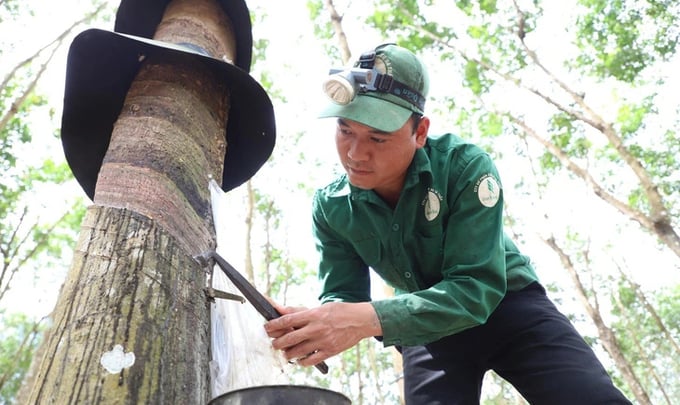May 29, 2025 | 09:01 GMT +7
May 29, 2025 | 09:01 GMT +7
Hotline: 0913.378.918
May 29, 2025 | 09:01 GMT +7
Hotline: 0913.378.918

Vietnam's rubber industry has great potential to sell carbon credits. Photo: Trung Tan.
At the seminar "Carbon credit market: Perspectives from economics, environment and legal framework" organized by Phap Luat Vietnam newspaper on June 12, experts said it is necessary to complete the legal framework soon for the carbon credit market in Vietnam to develop sustainably.
Mr. Vo Xuan Vinh, Professor and Dean of the Institute of Business Research, University of Economics Ho Chi Minh City, said that Vietnam has 1,912 establishments conducting greenhouse gas emissions inventories; according to regulations, they are subject to potential for the carbon credit market.
In addition, Vietnam has 276 projects with nearly 30 million certified carbon credits from projects under the Clean Development Mechanism (CDM). More than 300 programs and projects have carried out voluntary carbon credit buying and selling transactions.
According to Mr. Vinh, Vietnam has more than 14 million hectares of forests with the potential to create carbon credits from forest protection and restoration projects.
It is estimated that Vietnam can sell 57 million carbon credits to international organizations, and Vietnam can earn hundreds of millions of dollars each year.
In addition, agricultural projects such as low-carbon farming and sustainable management of land resources also have great potential to reduce greenhouse gas emissions and generate carbon credits.
Mr. Vinh assessed that participating in the carbon credit market also opens the possibility of cooperating with international organizations and receiving financial and technological support from green investment funds. "Investment opportunities in green technology and renewable energy not only help reduce long-term costs but also improve operational efficiency and comply with more stringent emissions regulations," Mr. Vinh said.
Meanwhile, Mr. Cao Tung Son, Head of the Hydrometeorology and Climate Change Office under the municipal Department of Natural Resources and Environment, said that Ho Chi Minh City has many advantages to implementing climate change mitigation projects to create carbon credits, such as being able to take advantage of public rooftops to increase energy saving and renewable energy production, reduce emissions, convert to electric motorbikes.
For the carbon credit market in Vietnam to develop sustainably, Prof. Dr. Vo Xuan Vinh believes that it is necessary to establish and complete a clear and comprehensive legal framework.
According to Mr. Vinh, the Government should issue detailed regulations on the mechanism for operating the carbon credit market, including creating, confirming, and trading carbon credits. Businesses and people have specific instructions to comply and effectively participate in the market.
In addition, it is necessary to develop regulations on greenhouse gas emissions inventories and detailed monitoring and reporting systems to help businesses conduct emissions inventories more efficiently and ensure transparency and accountability.
Meanwhile, Mr. Vo Trung Tin, Head of the Department of Land and Environmental Law, Faculty of Commercial Law, Ho Chi Minh City University of Law, said the tax issue of carbon credits in particular, as well as emission quotas in general, need to be researched and issued synchronously.
According to Mr. Tin, the carbon credit trading floor is expected to be operational in 2025 and officially operate in 2028. Therefore, the delay in promulgation will lead to losses for the whole state budget revenue, causing difficulties for businesses in accounting for this new type of asset.
Mr. Cao Tung Son said that carbon credits sold on the international market often have a higher price than the domestic market.
However, the processes and procedures for selecting an international exchange to list credits and the regulations and guidelines for choosing a global carbon credit certification unit have yet to be regulated.
Therefore, this unit also requests the Ministry of Natural Resources and Environment (MONRE) to guide the above content.
On January 7, 2022, the Government issued Decree No. 06/2022/ND-CP on greenhouse gas reduction, ozone layer protection, and carbon market.
According to the development roadmap, the period until the end of 2027 will develop regulations on carbon credit management, activities of exchanging greenhouse gas emission quotas, and carbon credits. From 2028, the official carbon credit exchange will be operated to regulate activities connecting and exchanging domestic carbon credits with regional and world markets.
To gradually realize this strategy, on October 22, 2020, the Emission Reduction Payment Agreement (ERPA) in the North Central Region of Vietnam was signed between Vietnam and the World Bank for six provinces from 2018 to 2024. Vietnam transferred 10.3 million tonnes of carbon to the World Bank with a total USD 51.5 million.
Translated by Huong Giang

(VAN) The mutual export of agrifood products between the European Union (EU) and the United Kingdom (UK) must occur again without certification, border controls or other red tape. This was agreed at the UK-EU summit.
/2025/05/22/5121-2-173645_677.jpg)
(VAN) NBSAP Tracker identifies strengths and areas for improvement in the National Biodiversity Strategy, based on each region’s priorities and capacities.

(VAN) The draft amendment to the Circular on rice export trading stipulates a periodic reporting regime for rice exporting enterprises.

(VAN) Dong Thap farmers attained an average profit margin of 64% during the summer-autumn 2024 crop (first season), while An Giang and Kien Giang farmers followed with 56% and 54%, respectively.

(VAN) As a doctoral student doing research on renewable energy and electrification at Harvard University, the author shares his musings on electricity, nature, and countryside memories.

(VAN) The decree on Extended Producer Responsibility (EPR) ensures transparent management and disbursement of support funds, avoiding the creation of a “give-and-take” mechanism.

(VAN) Hue City rigorously enforces regulations regarding marine fishing and resource exploitation, with a particular emphasis on the monitoring of fishing vessels to prevent illegal, unreported, and unregulated (IUU) fishing.